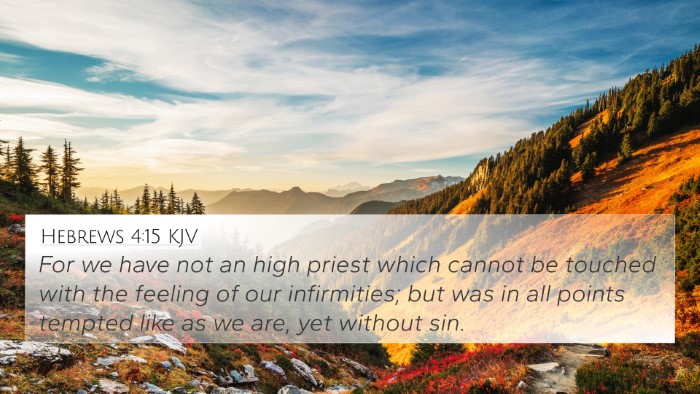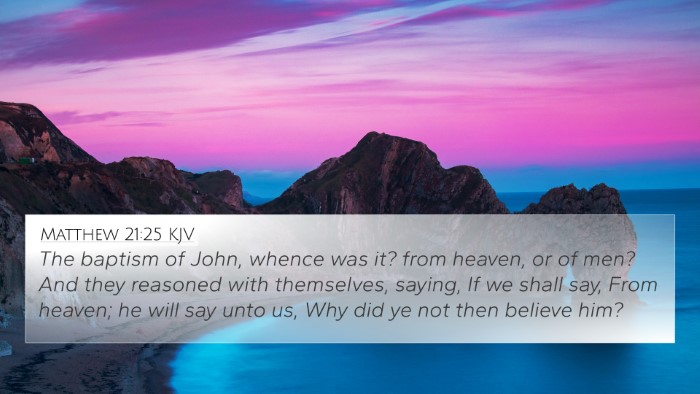Understanding John 8:46
Bible Verse: "Which of you convicts me of sin? And if I tell the truth, why do you not believe me?" - John 8:46 (NKJV)
Verse Meaning Summary
John 8:46 captures a pivotal moment in Jesus' confrontation with the religious leaders. In this verse, Jesus challenges them directly, asking whether anyone can accuse Him of sin. His rhetorical question emphasizes His blamelessness and truthfulness, calling into question their disbelief in His message. The weight of this moment reflects both His divine authority and the hardness of the hearts that reject Him.
Insights from Public Domain Commentaries
Matthew Henry's Commentary
Matthew Henry observes that Jesus's inquiry was designed to expose the hypocrisy of His accusers. He points out that the Son of God had no sin, making His question about conviction profound. Henry emphasizes that the truth of Christ is often met with skepticism, highlighting the spiritual blindness that prevents recognition of His divine nature.
Albert Barnes' Notes on the Bible
Albert Barnes interprets this verse as a demonstration of Jesus' innocence. He notes that this question reveals not only Jesus’s purity but also challenges His listeners to examine their own claims against Him. Barnes mentions that the nature of sin is not merely a legal accusation but a reflection of the inner heart, thus presenting a broader theological implication about human sinfulness and the need for repentance.
Adam Clarke's Commentary
Adam Clarke comments on the implications of belief and refusal to believe. He explains that doubt regarding Jesus is a profound error considering the miraculous deeds He performed. Clarke underlines that if the truth indeed resides in Christ, the rejection of that truth leads to spiritual peril. His analysis serves to call readers back to the essence of faith and recognition of divine truth.
Cross-References to John 8:46
To deepen understanding of John 8:46, consider the following cross-referenced verses:
- John 3:20-21: This passage speaks to the judgment of those who love darkness rather than light, paralleling the theme of truth and revelation.
- 1 Peter 2:22: Refers to Jesus being without sin, linking to the challenge in John 8:46 regarding His purity.
- Matthew 12:18: Describes Jesus as the chosen servant in whom God delights, affirming His righteousness as questioned in John 8:46.
- Hebrews 4:15: Highlights His ability to empathize with human weakness while remaining sinless, connecting with His claim of innocence.
- John 14:6: Jesus’ declaration of being the way, the truth, and the life underlines the assertion of truth that John 8:46 hinges on.
- John 7:18: Discusses speaking from God and seeking glory for the One who sent Him, reinforcing the notion of divine testimony in John 8:46.
- Isaiah 53:9: Prophetic reference to Jesus being without transgression, which aligns with the inquiry of sin in John 8:46.
- Romans 3:23: Discusses the universality of sin, presenting a stark contrast to Christ's challenge that no one can convict Him.
- James 1:13: States that God cannot be tempted by evil, affirming the nature of Christ in John 8:46.
- Luke 23:4: Pilate’s proclamation of Jesus’ innocence provides historical corroboration to the claims made in John 8:46.
Theological Implications and Applications
This verse not only serves as a defense of Jesus's character but also offers insight into the nature of human belief and rejection. It suggests that disbelief is often rooted in sin and a refusal to confront the truth. The rhetorical nature of the question forces introspection on the part of the listener, prompting them to consider their own stance on Jesus.
Conclusion
In studying John 8:46 along with these commentaries and cross-referenced verses, one can appreciate the intricacies of faith, the nature of sin, and the essential call to recognize truth in Christ. This verse stands as a powerful statement regarding the identity and mission of Jesus, encouraging believers to explore the deep connections formed throughout scripture.













